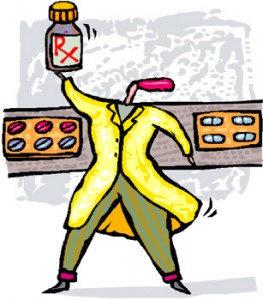 90% of people seek help identifying over-the-counter medications (OTCs) that suit their conditions. 80% of people ask pharmacists for counsel regarding which OTCs would best fit with their prescription medications.
90% of people seek help identifying over-the-counter medications (OTCs) that suit their conditions. 80% of people ask pharmacists for counsel regarding which OTCs would best fit with their prescription medications.
The pharmacist plays a central, pivotal role in the American health ecosystem, based on these data points from the American Pharmacist Association’s (APhA) Pharmacy Today Over-the-Counter Product survey.
In the Today’s perspective introducing the survey details, Dr. Stefanie Ferrari of the UNC Eshelman School of Pharmacy writes, “As more prescription products become available OTC, we need to think about the special populations we see every day and determine if the new nonprescription options are appropriate for these patients. Pharmacists are in a great position to gather information from patients and determine if they are self-care candidates.” Many pharmacists are advocating that pharmacists be part of the concept of the patient-centered medical home.
The survey results illustrates that self-health care — in my shorthand, DIY health — is exploding in terms of choices, information, and retail market channels. Key categories for DIY health include:
- Cough/cold/fever (with popular brands led by Robitussin, Sudafed, Mucinex, Tylenol, and Delsym)
- Allergy, led by Claritin brands
- Multivitamins, with Centrum at the #1 spot, and for calcium, Citracal and Os-Cal the top two brands
- Antidiarrheals, led by Immodium A-D
- Aspirin for cardioprotection, shared by two key brands — Ecotrin and Bayer
- Blood glucose monitors, with OneTouch and Accu-Chek in the top spots
- GI, a hot and competitive category for OTC-switch from prescription drugs; here, Zegerid is breaking through, following Prevacid’s success after Prilosec.
One of the newest areas of self-care is the sports category, including OTC tablets and drinks. The caffeine content of these products is very high, and Dr. Peter Ambrose of the Department of Clinical Pharmacy at LA’s Satellite Pharmacy Education Program covered the topic in Sports Health in January 2010. Dr. Ambrose noted that caffeine is a substance banned by the NCAA, and has prompted many questions to the National Center for Drug Free Sport. Dr. Ambrose discovered that caffeine is the 4th most common medication searched for in the ‘Drug Lookup’ field on the database. While caffeine is ubiquitous, it’s being marketed as a health enhancer, whether for pain relief and mental alertness to wakefulness in fatigued people.
Health Populi’s Hot Points: As health citizens take on more DIY health engagement, whether due to personal cost containment, health engagement, or physicians’ instruction, people will need greater OTC literacy. This is particularly important for health consumers taking chronic care medications on an ongoing basis, which increases the risk for adverse and serious drug-drug interactions. This calls for greater medication therapy management.
The pharmacist is center stage given his physical presence in the retail pharmacy. Pills, drinks and other front-of-counter products should be wrapped-around with information and communication that helps build OTC-literate health consumers. This is the purview of the manufacturer, as well as the health plan or payer that might be prescribing the OTC on the formulary as a first-order step therapy. Due to the nature of OTC, and the regulatory framework that supports the category, it’s a caveat emptor world. Here’s another category of health literacy that needs attention. The APhA survey press release speaks to the fact that pharmacists and ready and willing to play this role. If they do, they will become increasingly beloved to health consumers. It’s retail pharmacy’s bit opportunity as more Rx products come off-patent in the next few years.




 Interviewed live on BNN Bloomberg (Canada) on the market for GLP-1 drugs for weight loss and their impact on both the health care system and consumer goods and services -- notably, food, nutrition, retail health, gyms, and other sectors.
Interviewed live on BNN Bloomberg (Canada) on the market for GLP-1 drugs for weight loss and their impact on both the health care system and consumer goods and services -- notably, food, nutrition, retail health, gyms, and other sectors. Thank you, Feedspot, for
Thank you, Feedspot, for  As you may know, I have been splitting work- and living-time between the U.S. and the E.U., most recently living in and working from Brussels. In the month of September 2024, I'll be splitting time between London and other parts of the U.K., and Italy where I'll be working with clients on consumer health, self-care and home care focused on food-as-medicine, digital health, business and scenario planning for the future...
As you may know, I have been splitting work- and living-time between the U.S. and the E.U., most recently living in and working from Brussels. In the month of September 2024, I'll be splitting time between London and other parts of the U.K., and Italy where I'll be working with clients on consumer health, self-care and home care focused on food-as-medicine, digital health, business and scenario planning for the future...